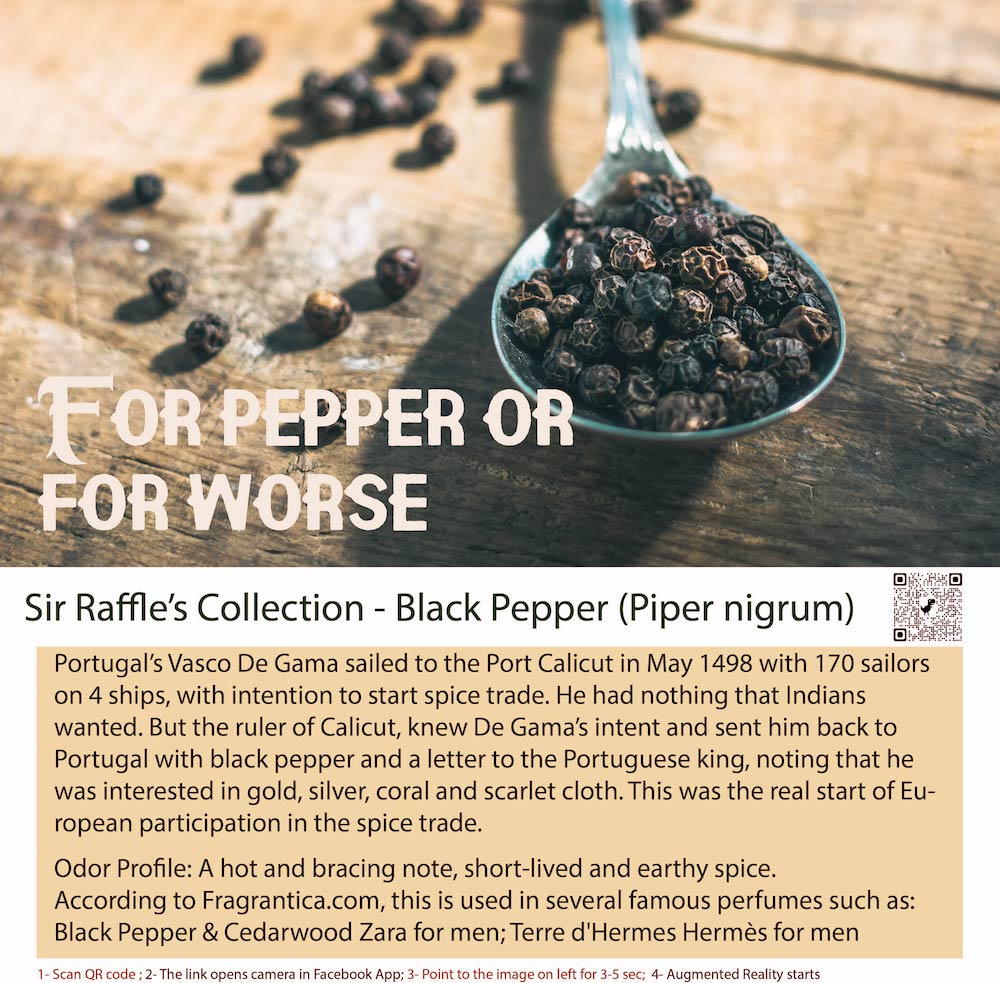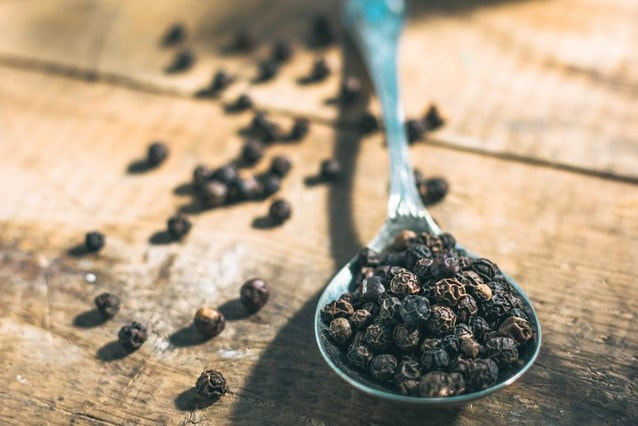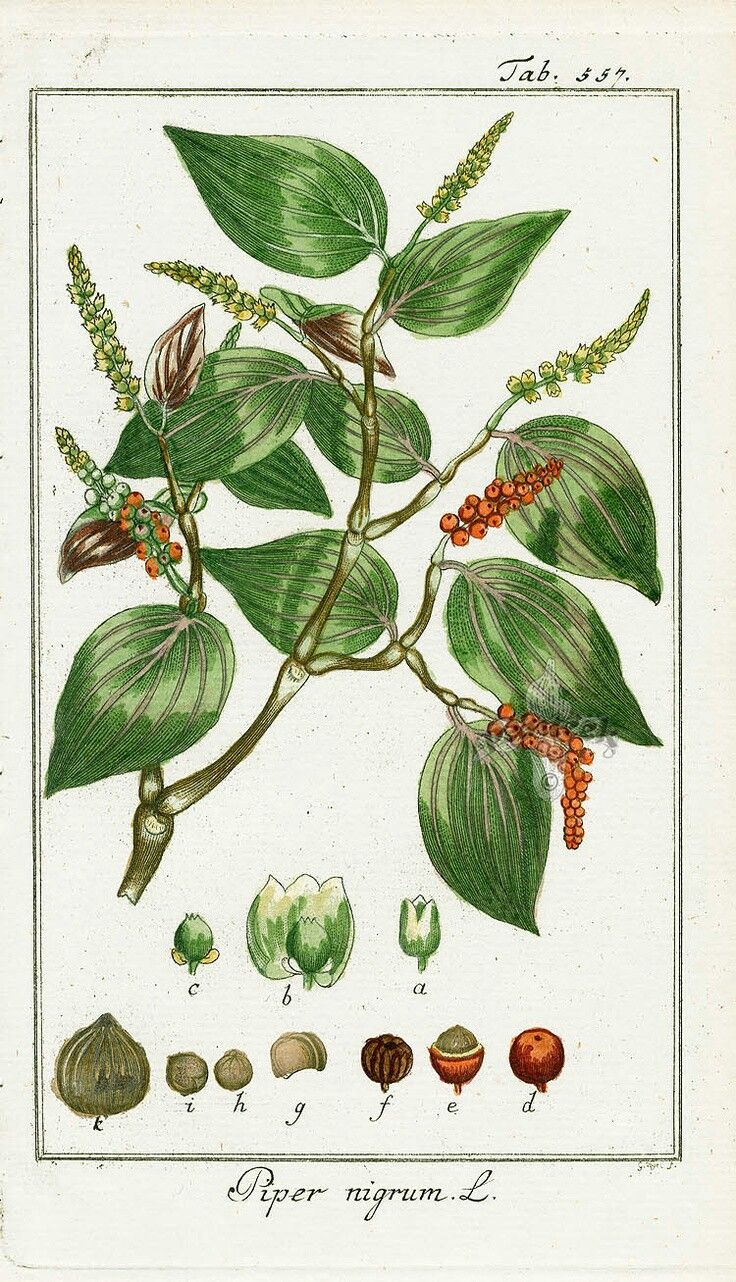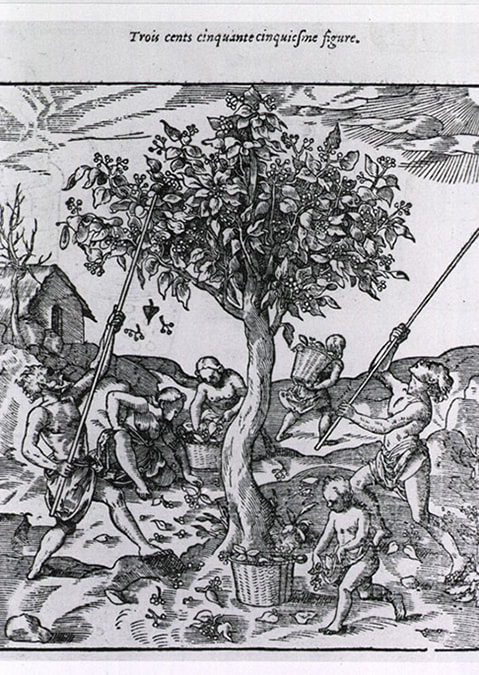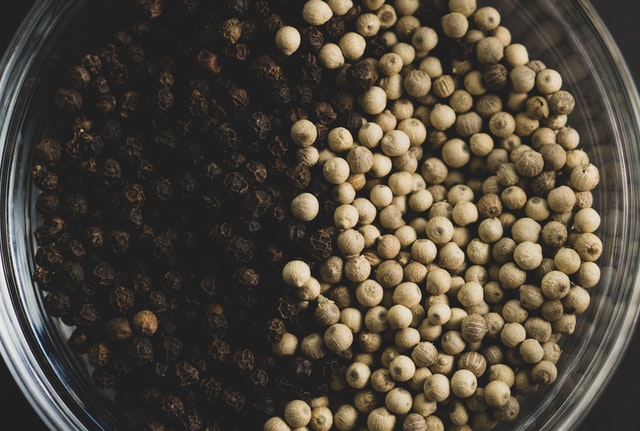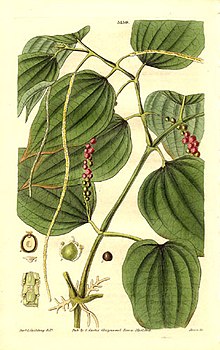Experience Oriental Aromas
Black pepper, scientifically known as Piper nigrum, is one of the most popular and widely used spices in the world. It has a long and illustrious history that spans across various cultures, making it a versatile ingredient not only in culinary delights but also in perfumes, therapeutic oils, traditional medicines, and more.
In the culinary world, black pepper is prized for its pungent and spicy flavor. It has been used for centuries to enhance the taste of dishes, and its distinctive aroma can enliven the senses. Black pepper is derived from the dried berries, or peppercorns, of the Piper nigrum plant. These small, dark, and wrinkled peppercorns are rich in essential oils and compounds that contribute to their unique flavor and aroma.
Black pepper has also found its way into the realm of perfumery. The essential oil extracted from black pepper is used as a base note in many fragrances. Its warm and spicy scent adds depth and complexity to perfumes, often creating a sense of allure and sophistication. The aromatic profile of black pepper blends harmoniously with other fragrance ingredients, allowing perfumers to craft intricate and captivating scents.
Beyond its culinary and perfumery uses, black pepper has a significant role in traditional medicine systems, particularly in Ayurveda and traditional Chinese medicine. In these ancient healing practices, black pepper is believed to possess various therapeutic properties. It is considered to be a warming spice, which means it can stimulate digestion and increase circulation. The active compound in black pepper, known as piperine, has been studied for its potential health benefits, including its anti-inflammatory and antioxidant properties.
Black pepper is also a prominent ingredient in many therapeutic oils and ointments used in aromatherapy and massage. When used in essential oils, black pepper's warming and stimulating qualities are harnessed to provide relief from muscle aches, fatigue, and even certain respiratory issues. In massage oils, it is often combined with carrier oils to ease tension and promote relaxation.
In the traditional medicinal systems of some cultures, black pepper has been used to address various health conditions, including digestive disorders, respiratory problems, and skin ailments. It has been incorporated into herbal remedies, teas, and infusions, further highlighting its versatility in supporting overall well-being.
Moreover, black pepper has been studied for its potential to enhance the bioavailability of certain nutrients in the body. The presence of piperine in black pepper can increase the absorption of various vitamins and minerals, making it a valuable spice in promoting overall nutrient assimilation.
In conclusion, black pepper is an extraordinary spice that has made its mark in various domains, from the culinary world to the realms of perfumery, traditional medicine, and aromatherapy. Its pungent and spicy flavor has delighted taste buds for centuries, while its warm and captivating aroma has enriched perfumes with sophistication and allure. Additionally, its therapeutic properties have been acknowledged and utilized in traditional healing systems, as well as modern research exploring its potential health benefits. With its versatility and rich history, black pepper remains an indispensable ingredient, enhancing not only the taste of food but also the sensory experiences and well-being of those who embrace its diverse applications.
In the culinary world, black pepper is prized for its pungent and spicy flavor. It has been used for centuries to enhance the taste of dishes, and its distinctive aroma can enliven the senses. Black pepper is derived from the dried berries, or peppercorns, of the Piper nigrum plant. These small, dark, and wrinkled peppercorns are rich in essential oils and compounds that contribute to their unique flavor and aroma.
Black pepper has also found its way into the realm of perfumery. The essential oil extracted from black pepper is used as a base note in many fragrances. Its warm and spicy scent adds depth and complexity to perfumes, often creating a sense of allure and sophistication. The aromatic profile of black pepper blends harmoniously with other fragrance ingredients, allowing perfumers to craft intricate and captivating scents.
Beyond its culinary and perfumery uses, black pepper has a significant role in traditional medicine systems, particularly in Ayurveda and traditional Chinese medicine. In these ancient healing practices, black pepper is believed to possess various therapeutic properties. It is considered to be a warming spice, which means it can stimulate digestion and increase circulation. The active compound in black pepper, known as piperine, has been studied for its potential health benefits, including its anti-inflammatory and antioxidant properties.
Black pepper is also a prominent ingredient in many therapeutic oils and ointments used in aromatherapy and massage. When used in essential oils, black pepper's warming and stimulating qualities are harnessed to provide relief from muscle aches, fatigue, and even certain respiratory issues. In massage oils, it is often combined with carrier oils to ease tension and promote relaxation.
In the traditional medicinal systems of some cultures, black pepper has been used to address various health conditions, including digestive disorders, respiratory problems, and skin ailments. It has been incorporated into herbal remedies, teas, and infusions, further highlighting its versatility in supporting overall well-being.
Moreover, black pepper has been studied for its potential to enhance the bioavailability of certain nutrients in the body. The presence of piperine in black pepper can increase the absorption of various vitamins and minerals, making it a valuable spice in promoting overall nutrient assimilation.
In conclusion, black pepper is an extraordinary spice that has made its mark in various domains, from the culinary world to the realms of perfumery, traditional medicine, and aromatherapy. Its pungent and spicy flavor has delighted taste buds for centuries, while its warm and captivating aroma has enriched perfumes with sophistication and allure. Additionally, its therapeutic properties have been acknowledged and utilized in traditional healing systems, as well as modern research exploring its potential health benefits. With its versatility and rich history, black pepper remains an indispensable ingredient, enhancing not only the taste of food but also the sensory experiences and well-being of those who embrace its diverse applications.
To experience augmented reality, please open the Facebook-app using QR code and point to the image below
Luxury Perfumes and Fragrance Oils
Black pepper, scientifically known as Piper nigrum, is a flowering vine belonging to the family Piperaceae. This spice is cultivated for its fruit, commonly referred to as peppercorns. Originally native to present-day South India, particularly the region of Kerala, black pepper is now grown in various tropical regions worldwide. Among the top producers of black peppercorns, Vietnam stands as the world's largest producer and exporter, contributing 36% of the global total with a production of 262,658 tonnes. Other major producers include Brazil, Indonesia, and India. Peppercorns hold a prominent place in global spice trade, accounting for 20% of all spice imports.
Given its high value, black pepper earned the title of the "king of spices" during the colonial era. Its demand was significant during this period, leading to its prominence in the British colonization of India. The British East India Company, a major British trading company, played a pivotal role in the spice trade, including black pepper, during this era.
In the early 17th century, the British East India Company established a trading post in Surat, a port city on the west coast of India. From there, they gained a monopoly on the trade of black pepper and other spices, sourcing them from the Malabar Coast of India. The control over the black pepper trade and other spices from India to Europe made the British East India Company's enterprise one of the most lucrative endeavors of the British Empire.
The pursuit of control over the Malabar Coast, a primary source of black pepper and other spices, led the British to confront the Dutch and the French in territorial conflicts. Eventually, the British managed to assert dominance in the region, establishing multiple settlements and trading posts along the coast.
In addition to the Malabar Coast, the British expanded their presence in India by establishing colonies in important trading hubs like Bombay, Calcutta, and Madras. These colonies served as significant centers of trade and commerce, bolstering the British economy and further consolidating their control over the spice trade.
In conclusion, black pepper's role in the British colonization of India was substantial. The British East India Company's monopoly on the spice trade, along with the conquest of the Malabar Coast, played crucial roles in their successful expansion and economic gains. The establishment of colonies in strategic locations solidified their presence in India's trade and contributed to their overarching influence in the region.
Given its high value, black pepper earned the title of the "king of spices" during the colonial era. Its demand was significant during this period, leading to its prominence in the British colonization of India. The British East India Company, a major British trading company, played a pivotal role in the spice trade, including black pepper, during this era.
In the early 17th century, the British East India Company established a trading post in Surat, a port city on the west coast of India. From there, they gained a monopoly on the trade of black pepper and other spices, sourcing them from the Malabar Coast of India. The control over the black pepper trade and other spices from India to Europe made the British East India Company's enterprise one of the most lucrative endeavors of the British Empire.
The pursuit of control over the Malabar Coast, a primary source of black pepper and other spices, led the British to confront the Dutch and the French in territorial conflicts. Eventually, the British managed to assert dominance in the region, establishing multiple settlements and trading posts along the coast.
In addition to the Malabar Coast, the British expanded their presence in India by establishing colonies in important trading hubs like Bombay, Calcutta, and Madras. These colonies served as significant centers of trade and commerce, bolstering the British economy and further consolidating their control over the spice trade.
In conclusion, black pepper's role in the British colonization of India was substantial. The British East India Company's monopoly on the spice trade, along with the conquest of the Malabar Coast, played crucial roles in their successful expansion and economic gains. The establishment of colonies in strategic locations solidified their presence in India's trade and contributed to their overarching influence in the region.
Discover Aromatic Black Pepper
Pepper, native to South Asia and Southeast Asia, has been an integral part of Indian cooking since ancient times, with references dating back to 2000 BCE. The port city of Muziris in Kerala, renowned for exporting black pepper and other spices, is mentioned in classical historical sources, emphasizing the importance of peppercorns as a highly prized trade commodity, often referred to as "black gold" and even used as a form of commodity money.
Pepper's trade connections with the West can be traced back to Greek and Roman texts, indicating an ancient trade route between India and the Western world. As early as 1000 BCE, traders from southern Arabia controlled the spice trade and pepper routes, holding a significant monopoly over this increasingly lucrative business. Evidence of black peppercorns being placed in the nostrils of Ramesses II during mummification rituals further underscores its value in ancient times.
During the early Roman Empire, in 30 BCE, maritime crossings of the Arabian Sea to India's Malabar Coast became routine. At this time, the Indian kingdom was under the Chera dynasty, and historical accounts by the Greek geographer Strabo mention the Roman Empire sending an annual fleet of around 120 ships to India and back.
Black pepper enjoyed widespread popularity in the Roman Empire, despite its expense as a seasoning. It even played a role in significant historical events, such as King Alaric of the Visigoths demanding 3,000 pounds of pepper as part of the ransom from Rome during his siege of the city in the fifth century.
In the Early Middle Ages, the spice trade came under Islamic control in central regions. However, Singapore emerged as a major trading port for black pepper during the colonial era, owing to its strategic location along the trade routes between India, China, and the East Indies. It became a hub for the trade of black pepper and other spices, attracting the presence of the British East India Company and other European trading companies.
During the 19th century, Singapore's prominence as a major center for spice trade grew, including not only black pepper but also nutmeg, cloves, and cinnamon. Early Chinese settlers in Singapore, mostly farmers from Fujian province, established pepper plantations in rural areas such as Kranji and Lim Chu Kang, contributing significantly to the black pepper trade in Singapore.
Moreover, Singapore became a significant processing and packaging center for black pepper. The city's warehouses and processing facilities were instrumental in cleaning, sorting, and packaging black pepper before shipment to other parts of the world.
Black pepper held vital importance in Singapore's history due to its strategic location and its role as a major trading port along crucial trade routes. The presence of the British East India Company and other European trading companies further boosted the spice trade. The contributions of early Chinese settlers in cultivating pepper plantations and Singapore's role in processing and packaging made it a significant player in the global black pepper trade.
Pepper's trade connections with the West can be traced back to Greek and Roman texts, indicating an ancient trade route between India and the Western world. As early as 1000 BCE, traders from southern Arabia controlled the spice trade and pepper routes, holding a significant monopoly over this increasingly lucrative business. Evidence of black peppercorns being placed in the nostrils of Ramesses II during mummification rituals further underscores its value in ancient times.
During the early Roman Empire, in 30 BCE, maritime crossings of the Arabian Sea to India's Malabar Coast became routine. At this time, the Indian kingdom was under the Chera dynasty, and historical accounts by the Greek geographer Strabo mention the Roman Empire sending an annual fleet of around 120 ships to India and back.
Black pepper enjoyed widespread popularity in the Roman Empire, despite its expense as a seasoning. It even played a role in significant historical events, such as King Alaric of the Visigoths demanding 3,000 pounds of pepper as part of the ransom from Rome during his siege of the city in the fifth century.
In the Early Middle Ages, the spice trade came under Islamic control in central regions. However, Singapore emerged as a major trading port for black pepper during the colonial era, owing to its strategic location along the trade routes between India, China, and the East Indies. It became a hub for the trade of black pepper and other spices, attracting the presence of the British East India Company and other European trading companies.
During the 19th century, Singapore's prominence as a major center for spice trade grew, including not only black pepper but also nutmeg, cloves, and cinnamon. Early Chinese settlers in Singapore, mostly farmers from Fujian province, established pepper plantations in rural areas such as Kranji and Lim Chu Kang, contributing significantly to the black pepper trade in Singapore.
Moreover, Singapore became a significant processing and packaging center for black pepper. The city's warehouses and processing facilities were instrumental in cleaning, sorting, and packaging black pepper before shipment to other parts of the world.
Black pepper held vital importance in Singapore's history due to its strategic location and its role as a major trading port along crucial trade routes. The presence of the British East India Company and other European trading companies further boosted the spice trade. The contributions of early Chinese settlers in cultivating pepper plantations and Singapore's role in processing and packaging made it a significant player in the global black pepper trade.
Our Exotic Black Pepper Fragrance Collection
By medieval times, the middle leg of pepper trade routes was still firmly controlled by Muslim traders, while Italian city-states like Venice and Genoa held a monopoly on shipping lines once the spice reached the Mediterranean.
Eventually, the rest of Europe got tired of paying the high Venetian prices for pepper imports and decided to take matters into their own hands. Thus began the age of Christopher Columbus, Vasco de Gama, Sir Francis Drake and other explorers.
The scent profile of black pepper is characterized by its warm, spicy, and slightly pungent aroma. The main chemical compounds responsible for the characteristic aroma of black pepper include:
The scent profile of black pepper can also vary depending on factors such as the variety of pepper, the growing conditions, and the method of processing. For example, black pepper from different regions can have different aroma profiles, such as the Malabar black pepper from India can have a more floral, woody and musky aroma compared to the Sarawak black pepper from Borneo which can have a more fruity and citrusy aroma.
In summary, Black pepper's scent profile is characterized by its warm, spicy, and slightly pungent aroma. The main chemical compounds responsible for the characteristic aroma of black pepper include Piperine, β-caryophyllene, Limonene, Pinene, Sabinene, β-myrcene, Terpinene-4-ol and Linalool. The scent profile of black pepper can also vary depending on factors such as the variety of pepper, the growing conditions, and the method of processing.
Eventually, the rest of Europe got tired of paying the high Venetian prices for pepper imports and decided to take matters into their own hands. Thus began the age of Christopher Columbus, Vasco de Gama, Sir Francis Drake and other explorers.
The scent profile of black pepper is characterized by its warm, spicy, and slightly pungent aroma. The main chemical compounds responsible for the characteristic aroma of black pepper include:
- Piperine: This compound gives black pepper its pungency and is responsible for the warm, spicy sensation in the nose and mouth.
- β-caryophyllene: This compound is responsible for the woody and spicy notes in the aroma of black pepper. It is also found in other spices such as cloves and cinnamon.
- Limonene: This compound is responsible for the citrusy and fresh notes in the aroma of black pepper.
- Pinene: This compound gives black pepper its fresh, pine-like aroma.
- Sabinene: This compound is responsible for the spicy and woody notes in the aroma of black pepper.
- β-myrcene: This compound gives black pepper its musky and earthy aroma.
- Terpinene-4-ol: This compound gives black pepper a spicy and fresh aroma, similar to that of clove.
- Linalool: This compound gives black pepper a floral and spicy aroma.
The scent profile of black pepper can also vary depending on factors such as the variety of pepper, the growing conditions, and the method of processing. For example, black pepper from different regions can have different aroma profiles, such as the Malabar black pepper from India can have a more floral, woody and musky aroma compared to the Sarawak black pepper from Borneo which can have a more fruity and citrusy aroma.
In summary, Black pepper's scent profile is characterized by its warm, spicy, and slightly pungent aroma. The main chemical compounds responsible for the characteristic aroma of black pepper include Piperine, β-caryophyllene, Limonene, Pinene, Sabinene, β-myrcene, Terpinene-4-ol and Linalool. The scent profile of black pepper can also vary depending on factors such as the variety of pepper, the growing conditions, and the method of processing.
Unique Scented Gifts from Singapore
The Aceh War (Indonesian: Perang Aceh), also known as the Dutch War or the Infidel War (1873–1904), was an armed military conflict between the Sultanate of Aceh and the Kingdom of the Netherlands which was triggered by discussions between representatives of Aceh and the United States in Singapore during early 1873.
There were several big and small war fought to control the pepper trade Another notable war is Dania war. This Pepper War was a military conflict between the European colonial powers over the pepper trade in Dania.
Anotehr one was the Battle of Colachel .
There were several big and small war fought to control the pepper trade Another notable war is Dania war. This Pepper War was a military conflict between the European colonial powers over the pepper trade in Dania.
Anotehr one was the Battle of Colachel .
Explore Our Aromatherapy Products
Pepper contains phytochemicals, including amides, piperidines, pyrrolidines and trace amounts of safrole, which may be carcinogenic in laboratory rodents. This same chemical gives pepper its spiciness. Black pepper contains between 4.6 and 9.7% piperine by mass, and white pepper slightly more. Piperine, by weight, is about 1% as hot as the capsaicin found in chili peppers.
One tablespoon (6 grams) of ground black pepper contains moderate amounts of vitamin K (13% of the daily value or DV), iron (10% DV) and manganese (18% DV), with trace amounts of other essential nutrients, protein, and dietary fibre.
One tablespoon (6 grams) of ground black pepper contains moderate amounts of vitamin K (13% of the daily value or DV), iron (10% DV) and manganese (18% DV), with trace amounts of other essential nutrients, protein, and dietary fibre.
Quality Fragrance Oils
The outer fruit layer, left on black pepper, also contains aroma-contributing terpenes, including germacrene (11%), limonene (10%), pinene (10%), alpha-phellandrene (9%), and beta-caryophyllene (7%), which give citrusy, woody, and floral notes.
These scents are mostly missing in white pepper, as the fermentation and other processing removes the fruit layer (which also contains some of the spicy piperine). Other flavours also commonly develop in this process, some of which are described as off-flavours when in excess: Primarily 3-methylindole (pig manure-like), 4-methylphenol (horse manure), 3-methylphenol (phenolic), and butyric acid (cheese).
The aroma of pepper is attributed to rotundone (3,4,5,6,7,8-Hexahydro-3α,8α-dimethyl-5α-(1-methylethenyl)azulene-1(2H)-one), a sesquiterpene originally discovered in the tubers of Cyperus rotundus, which can be detected in concentrations of 0.4 nanograms/l in water and in wine: rotundone is also present in marjoram, oregano, rosemary, basil, thyme, and geranium, as well as in some Shiraz wines.
These scents are mostly missing in white pepper, as the fermentation and other processing removes the fruit layer (which also contains some of the spicy piperine). Other flavours also commonly develop in this process, some of which are described as off-flavours when in excess: Primarily 3-methylindole (pig manure-like), 4-methylphenol (horse manure), 3-methylphenol (phenolic), and butyric acid (cheese).
The aroma of pepper is attributed to rotundone (3,4,5,6,7,8-Hexahydro-3α,8α-dimethyl-5α-(1-methylethenyl)azulene-1(2H)-one), a sesquiterpene originally discovered in the tubers of Cyperus rotundus, which can be detected in concentrations of 0.4 nanograms/l in water and in wine: rotundone is also present in marjoram, oregano, rosemary, basil, thyme, and geranium, as well as in some Shiraz wines.
Luxury Perfumes for Every Occasion
There are several famous perfume brands that have used black pepper as a key ingredient in their fragrances. Some examples include:
- Tom Ford: Tom Ford's Black Orchid perfume features black pepper as one of the main ingredients, giving it a warm and spicy aroma.
- Jo Malone: Jo Malone's Black Pepper and Basil cologne features black pepper as one of the main ingredients, giving it a spicy and fresh aroma.
- Dior: Dior's Homme Intense fragrance features black pepper as one of the main ingredients, giving it a warm and spicy aroma.
- Yves Saint Laurent: Yves Saint Laurent's La Nuit de L'Homme fragrance features black pepper as one of the main ingredients, giving it a warm and spicy aroma.
- Giorgio Armani: Giorgio Armani's Acqua di Gio Absolu fragrance features black pepper as one of the main ingredients, giving it a warm and spicy aroma.
- Prada: Prada's Luna Rossa Carbon fragrance features black pepper as one of the main ingredients, giving it a warm and spicy aroma.
Join Scentopia, Sentosa's latest tourist attraction wonderful orchid scent crafting, fragrance tour, bridal shower or corporate team building which includes perfume making onsite and offsite, beach activities and more. We also serve primary school learning journey, secondary students and pupil on industrial excursions. Know more about our orchids perfume bar or therapeutic orchid scents and other wellness aromas. Conatct Perfume workshop or book a scent crafting session here.

